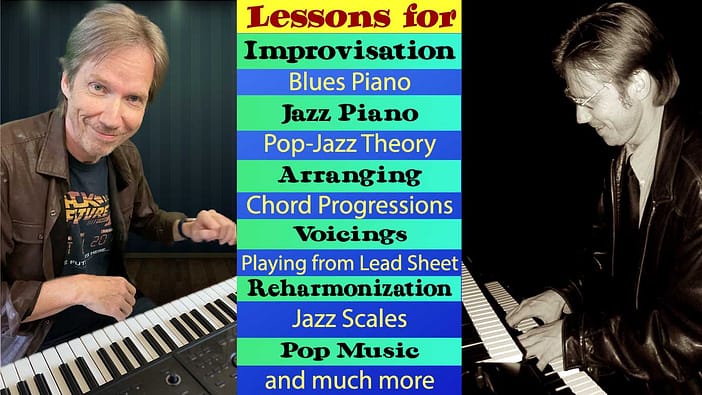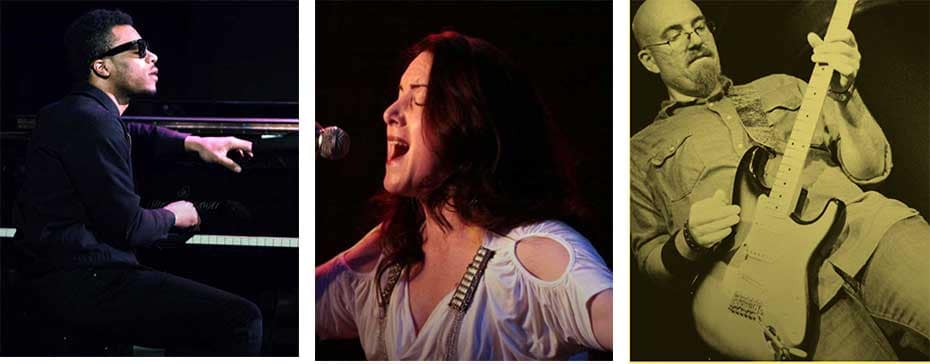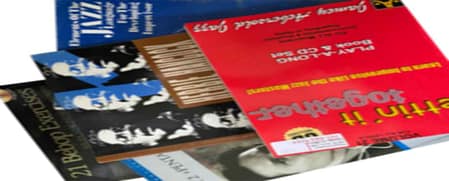
PopJazzKeys Piano Lessons with Thomas Gunther
Let Me Help You Improve your playing
We all lead busy lives with little time to spare. Let me help you develop a successful practice plan that fits your level, so you can improve more quickly!
Receive your free trial remote lesson and consultation with me, Thomas Gunther, a Chicago-based jazz pianist, pop keyboardist, music creator, and educator – no strings attached!
To learn more about me,
read about me, or visit https://www.thomasgunther.com
Taking Action is the First Step To Success!
Below, I posted two of my many piano video tutorials that showcase my teaching style and expertise. For all my piano-related instructional videos, visit https://www.youtube.com/@popjazzkeys

Still trying to decide about scheduling your free trial lesson?
Check out what some of my students say about me.
Every jazz musician's main question is what and how to practice to get better quickly

My main frustration with practicing pop-jazz piano is summarized by a simple question: What and how do I practice to get better quickly?
Classical musicians usually don’t face this issue. They choose a song and begin learning it. They also typically have a warm-up routine and a set of very specific technique exercises they perform regularly.
For jazz musicians, that’s a whole different ballgame. We aim to learn how to create music spontaneously, which calls for a completely different approach to practicing.
Over the years, I bought many books that promised to improve different aspects of my piano playing. They soon filled half of my bookshelf. Unfortunately, having all these great resources made my decision about what to practice and how not any easier; in fact, it made it even worse.
Whenever I had free time to practice, I wondered what I should focus on. There were so many skills I wanted to improve. But even after choosing what to work on, I still didn't know how to practice efficiently. Instead of focusing on meaningful practice, I often just played around on a tune I already knew. It was fun, but it didn’t really help me improve much. I can’t count how many hours I wasted just noodling instead of practicing systematically.
How You Can get better fast
In my frustration, at age 14, I finally decided to take lessons with a jazz piano instructor at our local music school. It was one of the best decisions I ever made for my piano career. He quickly identified my weaknesses, both musically and methodically. He promptly created a set of specific exercises and a practice plan that helped me improve my playing incredibly fast. Additionally, he reinforced my belief that I am talented and capable. It was an amazing experience. Yes, it cost me some money, but it was definitely worth it.
After three months of weekly lessons, he told me I was ready to meet with him only twice a month. We continued this schedule for two months. Afterwards, we agreed that I should schedule an occasional lesson only when I felt I needed his guidance. I will be forever grateful that he took me on as his student. I still benefit from his advice today, and I have applied much of it in my lessons to help my own students.
What defines a great teacher?
For me a great teacher is someone who has the ability to instantly see what your strengths and deficiencies are. Based on those findings, he/she devises a practice method and directs you to resources that are perfectly tailored towards your personal needs, so that you can get better fast. The ability to do this takes years of experience derived from teaching many students with all kinds of backgrounds.
Characteristics of a great instructor
There are, of course, many characteristics a great instructor possesses. Here are some:
With decades of experience teaching contemporary keyboard classes and jazz piano lessons to students of all ages and backgrounds, I am confident in my ability to be an effective piano teacher for learners at any level and with any goals.

Thomas Gunther with his students at Columbia College Chicago
What I would be able to do for you
1. Find the practice method that's right for you
It's a fact that every person learns differently. This means that a practice method that works great for one person might be a waste of time for someone else. An experienced teacher can quickly discover how you learn most efficiently so you don't waste time practicing in a way that doesn't suit you.
2. Give You Constructive Feedback
Another important advantage of taking lessons with a real person rather than, for example, watching a YouTube video is that you get instant feedback.
For example, whenever you play for your instructor, a new deficiency that needs to be addressed may surface, which you may not have noticed on your own.
2. Motivate You
An excellent instructor inspires you to put in more effort. Praise from someone you admire can be very impactful. A great instructor knows how to inform you when you're not performing well in a manner that encourages improvement rather than discouragement. Achieving this balance requires experience, as each student is unique.
When to Schedule Lessons: Regularly vs. On-Demand
Regular Lessons (Beginner to Intermediate Students)
From my experience, less experienced piano players benefit a lot from taking lessons regularly. Here's why. Most importantly, when taking lessons weekly with a skilled instructor, you'll learn how to practice systematically and build an efficient practice routine, which is key to improving quickly! After you've taken lessons regularly for a few months, you might start to space out the lessons from once a week to once every two weeks, and so on.
Lessons On-Demand (Intermediate to Advanced)
If you are an intermediate to advanced player, you might prefer taking lessons on demand only. For example, you can schedule a lesson to address a specific problem and won't return until you have another issue that needs solving.
Post that might interest you:
Benefits Of Taking Jazz Piano Lessons
